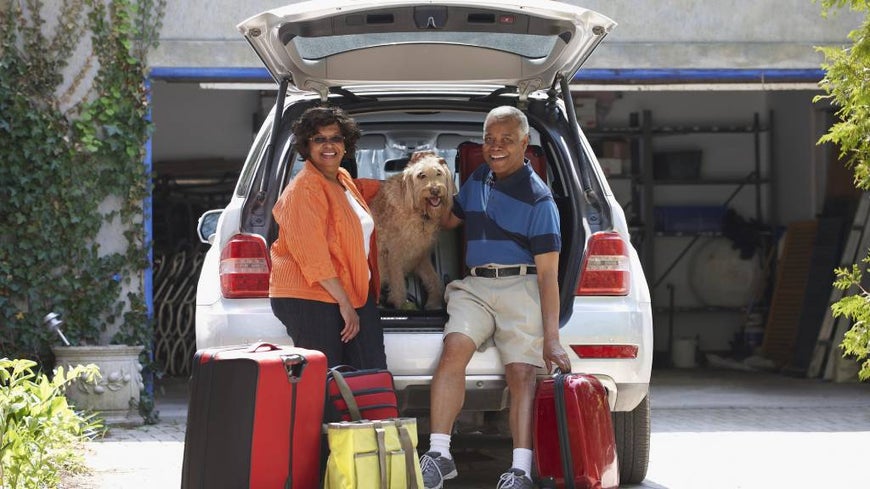Tips for a dog-friendly road trip

Written by Monique Butterworth for Australian Seniors.
Let’s face it, after the last few years we’ve had, we could all do with a holiday. And that includes our furry friends. They are family, after all.
The pandemic lockdowns saw a substantial boom in pet ownership in Australia, so it makes sense we’re now seeing a market for pet-friendly travel, hotels, holiday rentals and experiences.
With everything from luxury pet-friendly hotel pampering to camping and caravanning, planning a getaway with your pet has never been easier. While holidaying with dogs is most common, some pet-friendly places will welcome your cat, rabbit, guinea pig, bird or even your horse, too.
Holiday sites Stayz, Airbnb and Big4 Holiday Parks list pet-friendly properties in Australia, plus there are dedicated options such as holidayingwithdogs.com.au and pupsy.com.au
But just because we can holiday with our pets, should we? Veterinarian Dr Katrina Warren says dogs are generally easier to travel with than cats.
“It really depends on the cat. Some cats can get particularly stressed out with travel and unfamiliar surrounds,” she says. “You do need to be sensible and safe. Cats can run from environments they don’t know.”
Ideally, says Dr Warren, your dog should be obedient, crate trained and won’t stress if they’re left alone. “If the property you’re staying in is not secure or you’re camping or caravanning, having a pen or crate your dog is happy to go into is a must,” she says. “Taking your dog on a holiday can be a wonderful experience, but careful preparation is important to ensure the whole family has a safe and healthy time.”
She also advises being aware of destination-specific risks such as paralysis ticks and snakes.
You are unlikely to face such risks staying in five-star luxury. Not all hotels are pet friendly, however some provide a specific offering for pet owners, for example The Langham hotels in Sydney or Melbourne, welcomes not only dogs but cats, rabbits and birds in their special Pampered Pet packages. All dogs must weigh under 20kg. Comparatively, there’s no weight-shaming at the Art Deco Kimpton Margot Sydney where the policy is, if your pet can fit in the lift, they can stay.
Doggy day trips
But what about adventuring with your pet? Gourmet Pawprints offers boutique dog-friendly experiences in Victoria on board Bella the Bus, which has been specially kitted out for our four-legged friends. Day trips include wine and gin tasting (for the humans – picnic rugs and water bowls provided for the pooches), guided walks and scenic ferry rides.
All dogs are carefully introduced before boarding the bus and must be desexed, vaccinated to a C5 level and comfortable in the company of other dogs and humans.
Unfortunately, we still can’t take pets on board the cabin of an aircraft in Australia. Last December, the Civil Aviation Safety Authority updated its regulations for the carriage of animals on aircraft, essentially giving airlines permission to carry animals in cabins if they chose to. However major airlines Qantas, Jetstar and Virgin don’t allow it, with pets having to travel in the cargo hold. The exception is if they are a service dog, when they can travel in the cabin, subject to a bunch of restrictions.
Tips for a dog-friendly road trip by celebrity vet Dr Katrina Warren

Prior to departure
Make sure your pet’s microchip details are up-to-date with your current contact details. Ensure they are also wearing a collar with an ID tag engraved with your mobile phone number so you can be contacted quickly should they become lost. Consider investing in a pet tracking device or GPS dog collar.
Consider booking in a visit with your vet for a check-up to make sure your dog’s vaccinations, worming and flea treatments are up-to-date.
If you are travelling to a coastal destination, phone ahead to the local vet at your destination and ask if paralysis ticks are prevalent in the area. Paralysis ticks are deadly and you should to start preventative treatment prior to departing for your holiday.
Pack some home comforts including their own bed and favourite toys.
Avoid tummy upsets caused by dietary changes by taking your pet’s normal food. Don’t forget to pack any medication and preventative treatments for ticks and fleas.
If you’re heading somewhere coastal and your dog will be swimming, be sure to pack shampoo for washing and towels for drying your pet. And don’t forget to take a supply of poo bags, you can’t always rely on them being provided in the places you’ll visit.
On the road
When travelling in a car, dogs should be restrained by seatbelt or harness, confined in a crate or behind a grill. This prevents them from becoming a flying missile if you have an accident.
Stop every couple of hours for water and toilet breaks. Make sure your dog is attached to a lead when you let them out of your car in an unfamiliar environment. It is very useful to have your own water supply and bowl so you are able to stop anywhere for a break.
On arrival
When you arrive at your destination, keep your pet confined indoors. Many pets get lost on holidays and you can’t be too careful. Be sure to keep your dog on a leash for the first couple of days whenever you are in a new area.
Check carefully that the property is secure as dogs have a knack for finding hidden holes in fences.
27 Nov 2022